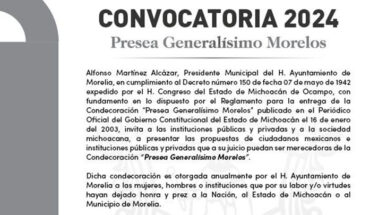Despite the fact that 62% of trans people reaffirm their sexual identity before the age of seven, according to the National Survey on Sexual and Gender Diversity (ENDISEG), until today Jalisco is the only entity in the country that does not impose age restrictions for the change of identity in the birth certificate.
“That is what ENDISEG proves; What science tells us, psychology, is that people reaffirm their gender identity in early childhood, between three and five years of age, cis and trans; the problem is that in cis people that process goes unnoticed because it is celebrated, it is subtle, and trans people it is at that stage that they realize, “says Andrés Treviño, director of Sexual Diversity of the state of Jalisco.
Ariel, a girl originally from Mexicali, Baja California, was an example of this when she traveled to that state, where minors can make their gender identity change on the birth certificate without restrictions. Since she identified her gender identity at an early age and her family understood it, they accompanied her to Jalisco when she was six years old.
“It’s not something that happens overnight, but after this process they started having a lot of problems with school; Then when he was six years old when he came to the Civil Registry office, when he came out with his certificate in his hand, he said ‘I’m finally going to go to school without being told anything’. Not only was she clear about who she was, but what discrimination is like at just six years of age. That is why it is so important: not only is it that they identify their identity, but since they begin to live it fully, they know what discrimination is, “says Treviño.
Adriana Sánchez, of the Association for Transgender Children, agrees that Jalisco is the most guarantor entity for the process of changing gender identity for children. So far, there are 23 states, he recalled, that have the right to change identity in birth certificates for adults.
Read more | 22.2% of trans people suffered aggression from their parents and 13.9% were taken to “conversion therapies”
In Mexico City it is allowed from the age of 12. Sinaloa and Oaxaca have also approved the administrative procedure, although without the same guarantees as Jalisco. Despite these advances, according to Sánchez it is not enough because many families do not have the conditions to access these entities.
“Jalisco does not put any condition of age, nor of entity of origin, so the majority of people who have access to make the trip, I want to tell you that they give many facilities. You can make an appointment by phone, send the documents in advance, so that the day the change is going to be made, does not take more than two hours. I do consider this an advance, a support because having a birth certificate means that they can already enter school and not have to give explanations to everyone, “said Sánchez.
Treviño explains that the procedure in Jalisco is a 100% administrative procedure, but also in the requirements and in the way of carrying it out, it is ensured that there are the least amount of barriers to make it accessible. In the first place, there is no age requirement because it is not a right attached to citizenship, which also responds to a perspective of the rights of children and adolescents. In Mexico, there are very few procedures that children and adolescents can do in their own right.
“This more progressive vision of the progressive development of the autonomy of children and adolescents implies that there are some rights that they can exercise directly; even if minors are accompanied by a father or mother, and they have to issue a letter of consent, whoever makes the request, who defines their name, their gender, who signs the application before the Civil Registry, is the interested person regardless of their age, “says Treviño.
In addition to that, a neighborhood requirement was not established, as in other states where proof of address is requested, such as Mexico City, where even organizations make an accompaniment to fulfill the requirement when people from other states go to the capital to the process. However, since all acts of the civil registry are valid in all states regardless of the entity where they are performed, in Jalisco it was considered completely unnecessary.
On the other hand, identification does not have to be official, as in states where INE or passport is requested, which in itself can be difficult for an adult trans person, and much more in the case of minors. Therefore, any photo ID is valid to do the procedure in The State.
One of the most interesting innovations, says Treviño, is that in the case of people who are from Jalisco – from the standard that the modification is integral – is that in addition to the birth certificate, the modification is made in all the documents of the civil registry that the person has.
“To guarantee this completeness in the process, what we do is not generate a new act, but we modify name and gender in the original act. The decision taken by the Civil Registry is to recognize a registry error and amend it. In the case of people who were registered in Jalisco, in their original act, which maintains the same registration date and folio number, name and gender are modified, unlike other states that raise a new act, “explains the director of Sexual Diversity.
For adults, having a very recent record can imply problems to do other procedures, because it is striking that years before apparently “they have not had a record”. That way, there is no evidence of the change being made. Although anyone from another state can go to Jalisco to carry out the process of modifying gender identity, this last standard only works for people born in the entity because of the access they have to their documents.
All these elements, Treviño emphasizes, are what allow people from all over the country to go to Jalisco to process the records of their sons, daughters and children.
Trans reform in Jalisco
From a ruling of the Supreme Court of Justice of the Nation (SCJN) of 2019, derived from an amparo against the municipality of Tlajomulco, it was found that the legislation that was in force in Jalisco already contemplated an assumption to modify the sex in the birth certificate, but there was no administrative procedure.
In addition to this, advisory opinion 24/2017, an international standard of the Inter-American Court of Human Rights (IACHR) on gender identity, equality and non-discrimination for same-sex couples, indicates that registering a trans person with a gender that does not correspond to him is a registration error. Through the link of local legislation with international parameters, the Civil Registry Regulations of the entity were modified.
With this, the five articles that regulate the administrative process in terms of requirements and deadlines were established. For this, the work of civil society was fundamental, which since 2015 was articulated and made strategic litigation so that the change of gender identity in birth certificates was a reality.
As of December 2018, the protection of the procedures that were carried out in other states began to be guaranteed and the route for the recognition of the right began to be planned, based on the analysis of the local context. “At that time, for example, despite the fact that equal marriage was a reality in Jalisco by mandate of the Supreme Court, Congress had not reformed the Civil Code,” he said.
Therefore, the political process of the gender identity change initiative going through Congress was going to take longer than desired, so the possibility of the decree being given from the Executive Branch was explored, which was achieved on October 29, 2020.
“In response to the work of civil society, the recommendations of the state human rights commission, we sought technical cooperation from the Organization of American States (OAS), and in November 2019 we had the technical visit of experts, who analyzed the context of Jalisco in light of international human rights obligations, and issued a report called Alternatives for the recognition of civil identity in Jalisco,” Treviño recalled.
The standards of suitability established by this report are those that are reflected today in the administrative process. Having a birth certificate where the sex and self-perceived identity of people coincide is the key to many institutional, health, educational procedures; particularly, in adolescents it is very necessary to avoid the forms of discrimination and social problems that they can face, added Adriana Sánchez, of the Association for Transgender Children.
He recounted how, from his own experience, the Ministry of Public Education (SEP), for example, refuses to name people in a different way than the one established by their birth certificate until a different document is presented, and even so, they face resistance.
“They said that the school had a self-management that allowed them to decide whether to appoint him or not. It can’t be this way. It has been a tremendous struggle that to date does not end. We are in Mexico City, so what would those prejudices have to weigh so much to hurt a child?”
While Jalisco has become the most guarantor state due to the four factors of no age or territorial limitation, the perspective of children’s rights and diversity, and the non-dependence on any third participant, in the capital of the country the limitations of access from the age of 12 remain, Exclusive for residents and dependent on the approval of cases by a council where five capital agencies are represented.
During the discussion “Discrimination against the LGBTTTIQA+ community”, Pablo Álvarez Icaza, Coordinator of Public and Legislative Policies of the Council to Prevent and Eliminate Discrimination of Mexico City, reported that LGBTTTI+ populations continue to be the fourth most discriminated group in the capital.
On the National Day Against Discrimination, despite various efforts, activists and government institutions concluded that it has not yet been possible to build a culture of human rights where people live free from discrimination and violence. Discrimination, stigma and stereotypes continue to permeate various sectors of society.
What we do at Animal Político requires professional journalists, teamwork, dialogue with readers and something very important: independence. You can help us keep going. Be part of the team.
Subscribe to Animal Político, receive benefits and support free journalism#YoSoyAnimal





